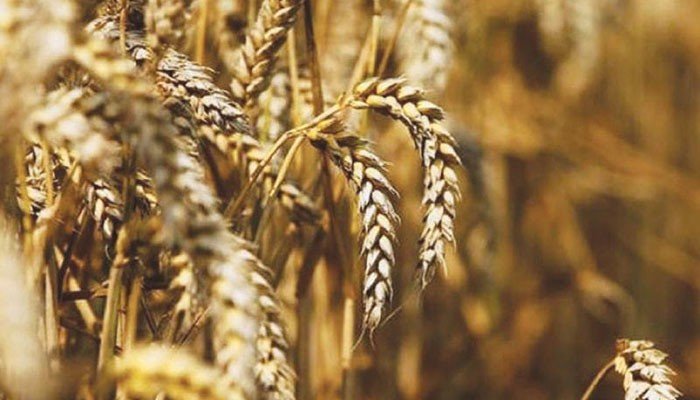Influential people behind hoarding of 5 MMT of wheat
Large quantities of wheat have been hidden in rice mills, sugar mills, spinning mills and warehouses owned by influential individuals
July 03, 2020

Hoarders have illegally stockpiled over five million metric tons (MMT) of wheat this year, officials of the ministry of national food security and research reveal.
"Hoarding of wheat is a major concern this [harvesting] season,” a senior official of the ministry told Geo.tv, asking not to be named. “An estimated five million metric tons of wheat is being kept unlawfully either by influential middlemen, businessmen or flour mill owners.”
Large quantities of the crop have been hidden in rice mills, sugar mills, spinning mills and warehouses owned by influential individuals, the official added.
Most of these warehouses and mills are located in the bordering areas of the four provinces, namely Kashmore, Sadiqabad, Rahimyar Khan, Bhakkar, Dera Ismail Khan and Peshawar, amongst others.
“These hoarders have strong political backings,” the senior official explained, “And a few are even in the current government.”
Pakistan has missed its target of wheat procurement by around 20% this year. The government set a target of lifting 8.2 MMT of wheat, which was 32% of the total production, but it could only procure 6.6 MMT.
Punjab procured 4.08 MMT this year, lower than the 4.9 MMT it lifted last year. Similarly, Khyber Pakhtunkhwa procured 0.44 MMT, a decline from 0.96 MMT last year. However, Sindh and Balochistan picked up a larger share of the crop, compared to 2019.
This year, Sindh procured 1.2 MMT, while last year it only got 0.8 MMT. Balochistan procured 0.92 MMT.
Meanwhile, the administration in all districts has set in place measures to penalize hoarding, in order to ensure there is no shortage of the food crop in the country.
Interestingly, government officials claim that the Pakistan Flour Mills Association lifted an estimated 2 MMT of the crop, but the PFMA chairman told Geo.tv that he only purchased 60,000 to 70,000 MMT from the open market as the provincial food departments did not allow the Association to buy more.
Pakistan is likely to consume 27.47 MMT of wheat from April 2020 to April 2021, according to official statistics. But the total production in the country was only 25.457 MMT.
However, if Pakistan were to import wheat to fill the shortfall in demand, it could end up paying Rs.1,963 per 40-kg, official figures reveal. The price of the ‘Red Hard Winter’ variety of wheat, grown mostly in the United States, would be $266 per ton, including freight charges of $50 per ton. Moreover, imported wheat will be available in cities like Multan with an additional cost of Rs.100 per 40-kg, on account of transportation charges, official documents noted.
According to Dr. Aslam Gill, the former wheat commissioner, wheat has now become a political commodity, the same as sugar.
“Politically influential people, with government backing, have been hoarding wheat in huge quantities to control the market,” Gill said. “Price hike is not due to any deficiencies in the supply chain, rather it is due to millers and the middle men’s monopoly. Also, the failure of the food department to check such practices.”
This year, the state-run Pakistan Agricultural Storage and Services Corporation (PASSCO) and provincial governments set up 1,162 wheat purchasing centers across the country. The centers were to facilitate farmers to sell their crops at fixed rates.
Separately, the ministry of national food, PASSCO and secretaries of food departments of provinces set the wheat procurement target of PASSCO at 1.8 million MMT wheat, of which purchase for Punjab was 4.5 MMT, Sindh 1.4 MMT, Balochistan 1 MMT and KP 0.45 MMT.
But due to the scarcity of the crop, PASSCO will now be releasing 0.25 MMT of wheat to flour mills to ease the shortage and the resulting price hike. However, they fear that an early release of wheat to flour mills and hoarding of surplus wheat may lead to another crisis during October and November this year. As per the general practice, PASSCO releases wheat to mills around August every year, not earlier.
“There is a shortfall of 1.411 MMT of wheat this year,” a spokesperson of the ministry of food told Geo.tv, on the condition of anonymity. “The shortfall is going to be mitigated by importing 1.5 MMT of wheat through the private sector for now.”
Managements of other stakeholders namely PASSCO, food departments of provinces, CCP and USC did not respond to Geo.tv’s requests for comments.











